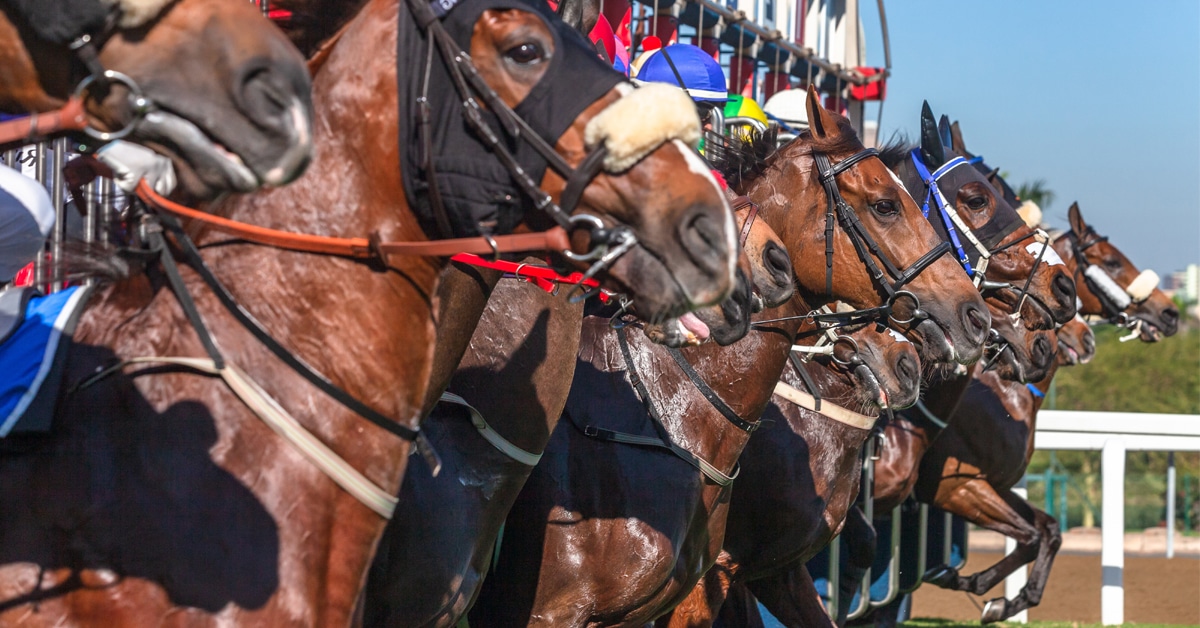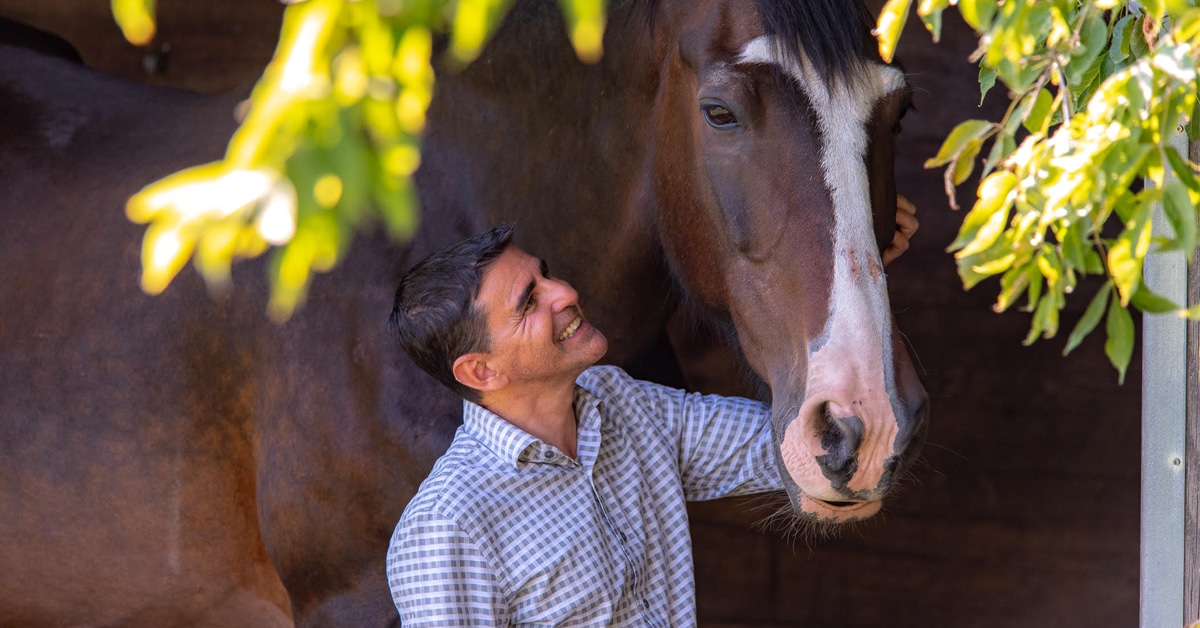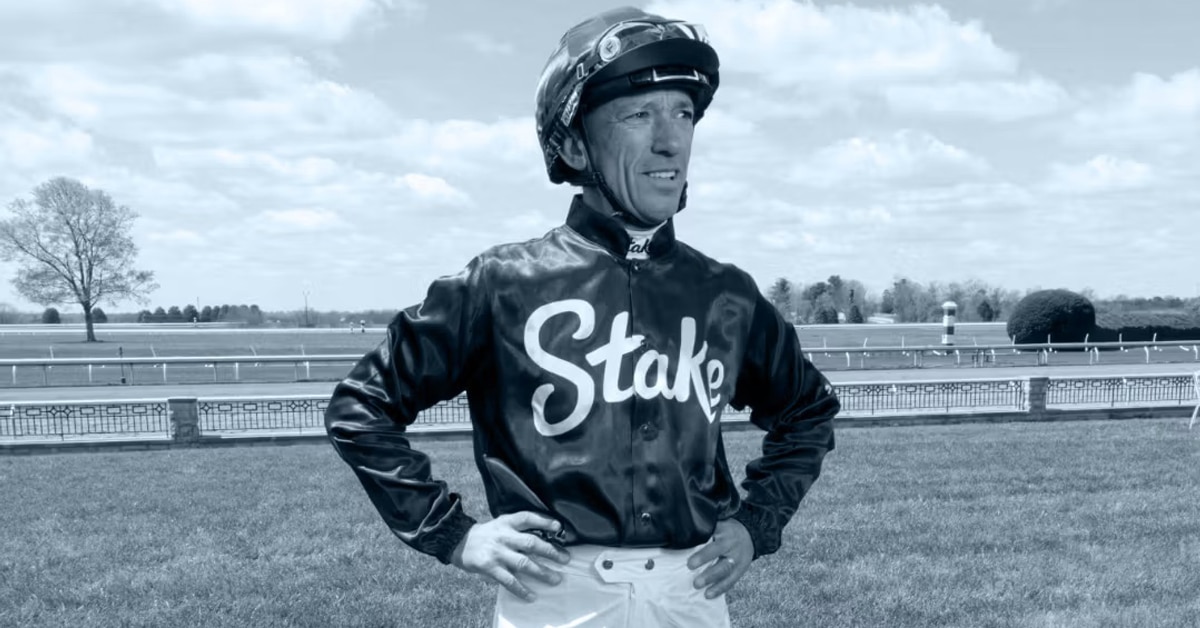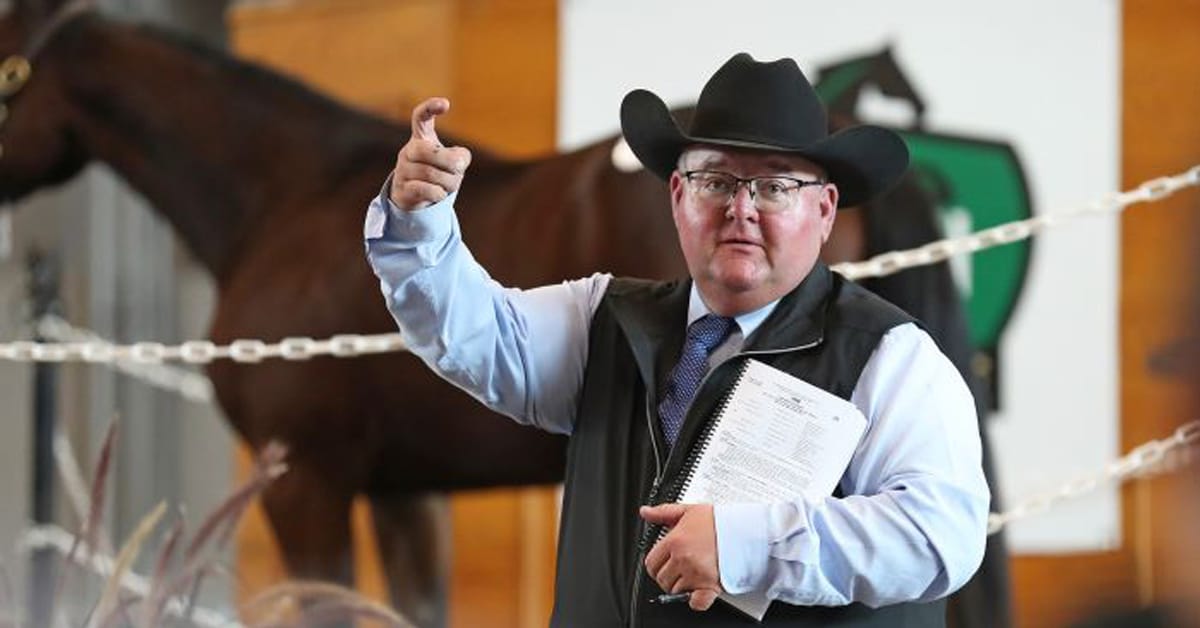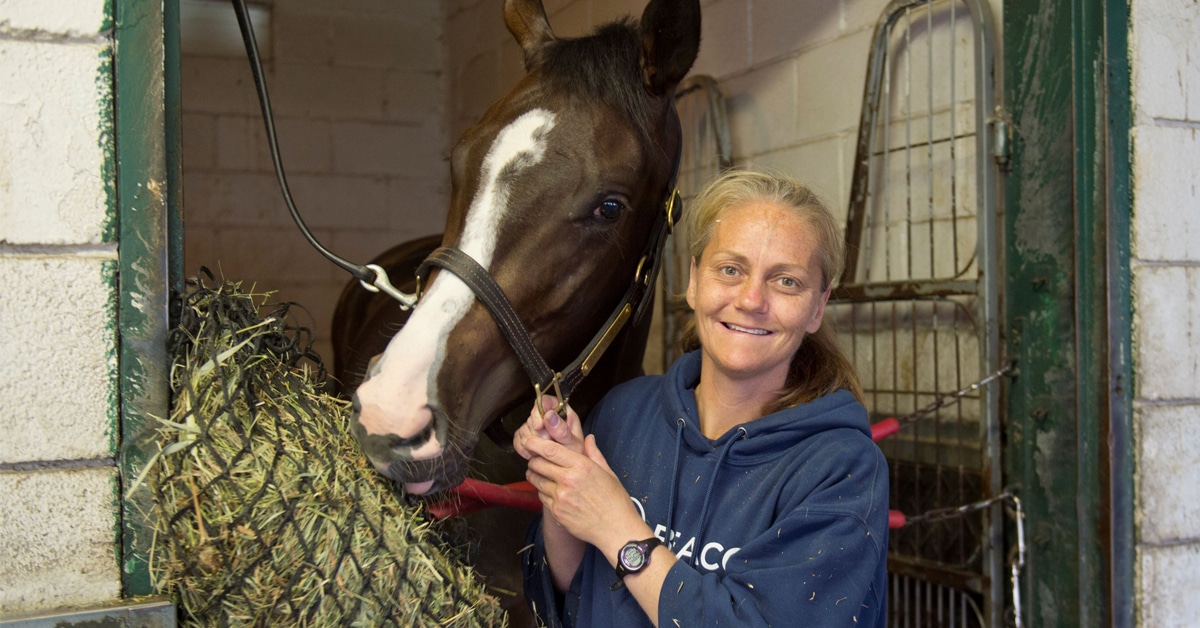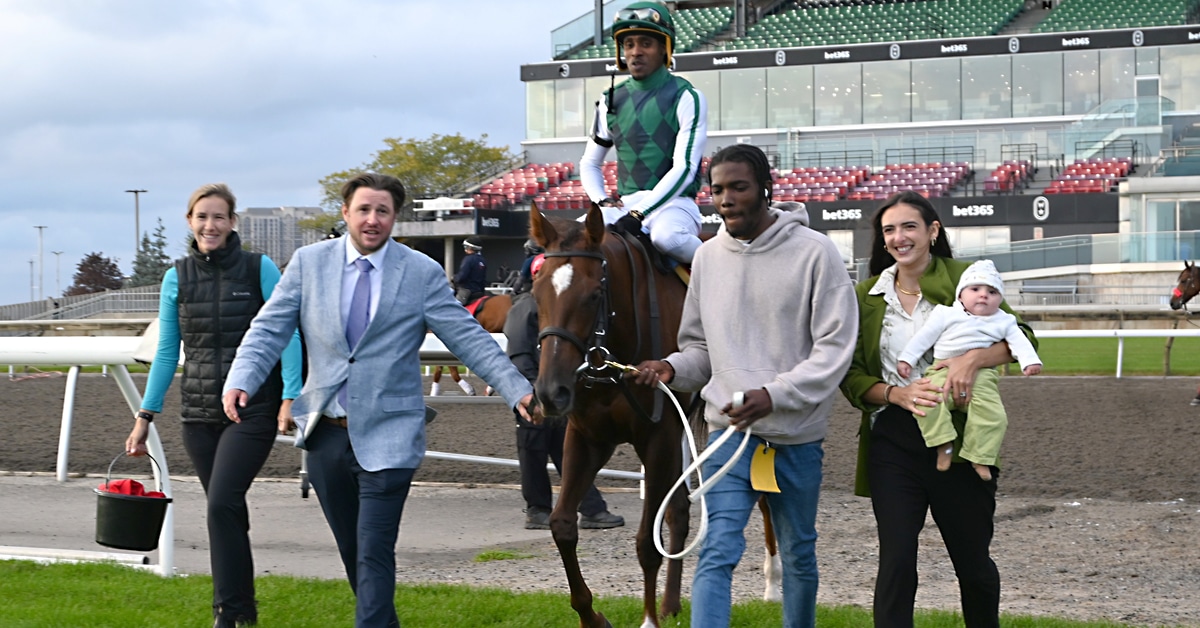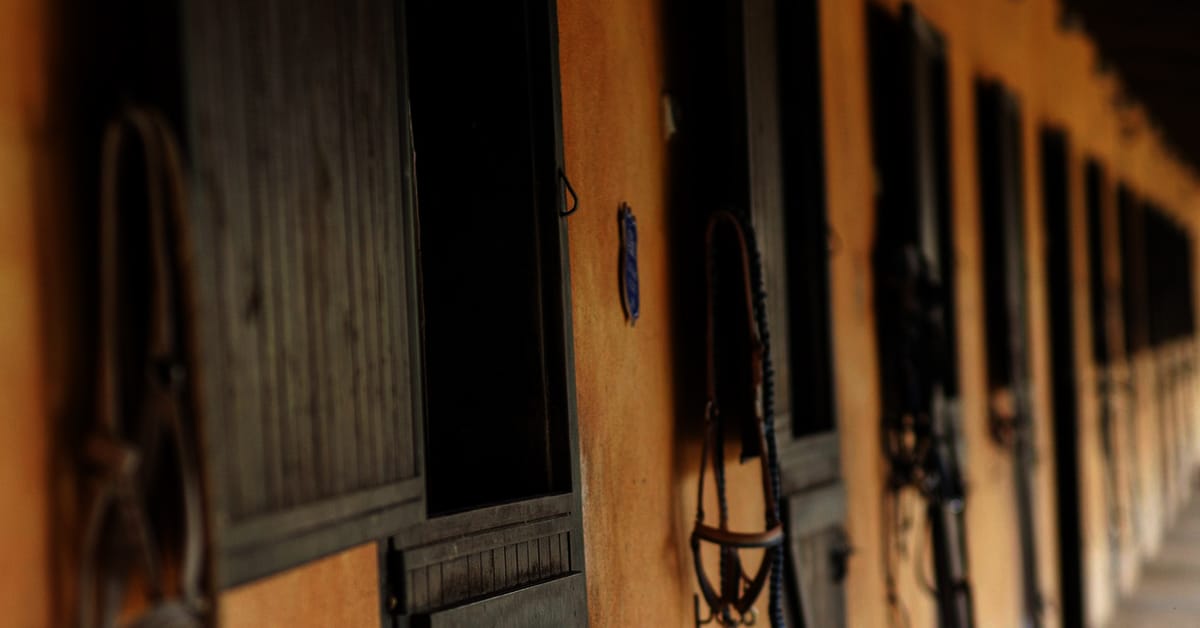On the final Saturday afternoon in October, The Meadowlands Racetrack in New Jersey was buzzing as hives of shouting bettors clutched tickets, eyes locked on TV screens. The leading harness racing track, located across the Hudson River in the shadow of Manhattan, was playing host to the Breeders Crown — standardbred racing’s version of the Breeders’ Cup. Championship harness racing had brought more than the usual level of in-house pari-mutuel interest to the building, but, truth is, more people were there to bet on college football and other sports in the FanDuel Sports Book. Either way, The Big M was pulsing with the kind of energy now missing from most racetracks that barely register a pulse on all but their biggest stakes days.
Jeff Gural, The Meadowlands’ principal owner, was loving what he was seeing.

Jeff Gural, principal owner of The Meadowlands Racetrack in New Jersey, said sports betting has been a gamechanger, but has shown limited benefit for horse racing. (Lisa Photo)
“It does add energy to the place, so there’s action,” Gural said of the FanDuel Sportsbook, which is the most successful sportsbook in the world outside of China. “If you come to The Meadowlands on a day when there’s horse racing and sports betting and something people really want to see — UFC is very popular on Saturday nights. Football, obviously, is on Sunday, but we don’t race on Sunday — it has livened up the place, which is important. So, you walk into The Meadowlands and wherever you turn there’s action. You have simulcast, you have live racing, you have sports betting. So, I think it helps from that perspective.
“People want to go where it’s crowded. That’s a fact.”
It is exactly the kind of scene Woodbine Entertainment Group (WEG) CEO Jim Lawson is hoping to bring to racetracks in Ontario when single sports betting begins in the first quarter of 2022. Like The Meadowlands – which is located in northern New Jersey directly beside the Met Life Stadium that is home to the NFL’s New York Jets and New York Giants in a hugely populated area that includes New York City – Woodbine has key locations in the Greater Toronto Area (GTA) and beyond. Woodbine Racetrack is just down the street from Pearson Airport. WEG’s Greenwood Teletheatre — on the site of the former Greenwood Raceway — is on the shores of Lake Ontario in downtown Toronto. The WEGZ Stadium Bar is located in the booming city of Vaughan on the northern edge of the GTA and Woodbine Mohawk Park lies next to the North America’s busiest highway, the 401, to the west of the GTA in Milton, one of the fastest growing communities in Canada.
“We’ve got the deepest physical sportsbook localities in the entire province when you think of Woodbine, Mohawk, Greenwood, WEGZ,” Lawson said.
Woodbine also operates teletheatre locations in the most populous areas of Ontario.
“We have 48 Champions lounges. So… we have 48 sports betting locations,” Lawson said. “There is an opportunity for the government and for the racetrack industry… The racetrack industry is heavily subsidized, the racetracks lose money, including ours. This is an opportunity to fix that.
“In the case of Woodbine, I’ve made this point over and over, we have a nonprofit mandate, we don’t have any shareholders, we’re Canadian, we’re capable, our technology is good, the AGCO (Alcohol and Gaming Commission of Ontario) is familiar with our management, there’s no reason whatsoever to think that sportsbooks should be going to casinos or just to casinos. We acknowledge there could be competition. We’re not looking for exclusives on sportsbooks, but we’re, basically, turnkey on sportsbooks.”
On top of its Champions Teletheatres, Woodbine-operated HorsePlayer Interactive (HPI) has deals with all the tracks in Ontario, meaning WEG, through HPI, could partner to set up sportsbooks at tracks in or near Ottawa (Rideau Carleton Raceway), Hamilton (Flamboro Downs), London (The Raceway at The Western Fair District), Barrie (Georgian Downs), Kitchener-Waterloo (Grand River Raceway), Peterborough (Kawartha Downs) and more.
Lawson believes all that makes WEG a great candidate to set up sportsbooks at those locations and others to quickly provide physical locations across the province to provide the greatest return on the proceeds of sports betting for the government.

Woodbine CEO Jim Lawson said it’s necessary for horse racing to get a cut of sports betting in Canada in order to offset cannibalization of pari-mutuel bettors. (Dave Landry photo)
It’s the pitch Lawson keeps making to the government. Trouble is, he’s not sure the government is listening. Lawson’s fear is those deciding how sportsbooks are rolled out in Ontario are leaning toward a distinctly Las Vegas model where sportsbooks are located in casinos.
“You see that only in Las Vegas. You don’t see sports betting joined at the hip (with casinos) anywhere in the world,” said Lawson, whose chief concern is that model, if applied to Ontario, would shut horse racing out of the sports betting game.
“A lot of the sports betting operators across the world find their origins in horse racing when you think of the big names like William Hill and Tabcorp and others. They are all horse racing operators… I think there’s a misconception that somehow sportsbooks and sports betting goes with casinos. That is not the case anywhere in the world with the exception of the United States where we associate sportsbooks with Las Vegas. Otherwise, if you think of the ways that sports betting operates in the United Kingdom, in particular, and in Ireland and France and Australia, it’s a coordinated sportsbook. There are sportsbooks on every block in Ireland and England. It’s all horse racing and sports betting. It’s not this concept that somewhere casinos have sportsbooks.”
Stakes High For Horse Racing
The stakes for horse racing are high. Sports betting began in New Jersey in middle of 2018 and Gural said it is inevitable Woodbine will lose horse bettors to sports betting because that’s exactly what has happened in New Jersey.
“(Woodbine) will lose people to sports betting and young people will gravitate to sports betting,” Gural said.
Lawson said the goal of getting a piece of the sports betting pie is not to enhance purses or necessarily improve Woodbine’s bottom line, but “to address the expectation that sports betting is clearly going to cannibalize parimutuel wagering. That’s been the experience at The Meadowlands, that’s been the experience everywhere… So, we need to do this in order to stem that tide. I’m expecting (if we get a cut of sports betting) we will be able to hold the line and keep our purses and maintain all the jobs. If the government doesn’t see it that way they’re really going to hurt the industry and hurt the jobs.”
Lawson said a further advantage to allowing Woodbine a cut of the sports betting action is it would speed up how quickly horse racing can eliminate the need for government subsidies. Currently, Ontario’s horse racing sector receives about $100 million in annual subsidies from the province. It’s an arrangement Lawson views as untenable long-term, which is why, for many years, he has been an advocate of giving Woodbine the tools to be financially independent and off government support before the government decides to remove that support.
“I don’t expect we’re going to have our cake and eat it too, that we’re going to, all of a sudden, be running 30 or 40 retail sportsbooks and the government is going to keep throwing money to us through the funding agreement,” Lawson said. “I think it’s ultimately going to work out that we’ll be on our own, they’re going to see that we’re going to be heavily-regulated, they’ll see our income and they’ll try to keep us even.
“There’s a real opportunity for the government to earn money and, at the same time, support the horse racing industry and start to chip away at eliminating altogether the subsidy for horse racing. Put horse racing on independent, healthier grounds. And just think what the future of racing would be like in this province if we didn’t need any government subsidy. Woodbine Entertainment could operate totally independently and the only way we’re going to do that is through sports betting and through real estate development and that’s my goal to get us there in five years’ time. I did say three years’ time, but that’s all been delayed by the pandemic. But I think in five years’ time, we could see independence from the government from the funding agreement.”
How Did We Get Here?
Woodbine has lobbied for at least 15 years — going back to when David Willmot was the CEO — for a change to the Canadian criminal code to allow single sports betting in effect to stem the tide of bets going to illegal off-shore operators. Parlay betting, as allowed by the likes of the Ontario Lottery and Gaming (OLG) corporation’s ProLine product, has been legal since 1992.
In May of 2018, thanks in large part to a lobbying effort started by Monmouth Park’s Dennis Drazin, the Supreme Court of the United States struck down a 1992 federal law effectively banning single sports betting in most states (Nevada made sports betting legal in 1949). That opened the door to legalize single sports betting for states that wished to do so. Some, like New Jersey, did so immediately.
Currently, sports betting is technically legal in 30 states, though some — like New Jersey’s direct competitor in New York — have yet to officially launch, but are expected to do so before February’s Super Bowl.
It is believed the legalization of sports betting in the U.S. — and the many partnerships that have sprung up between sports betting companies and professional sports teams that once vigorously fought sports betting — has led Canada to legalize the practice and reap the proceeds from it. But it wasn’t until 2021 that the movement toward single-game sports betting gained traction with politicians looking to raise revenue during the COVID-19 pandemic.
Initially, the Canadian horse racing industry was concerned an early version of MP Kevin Waugh’s Bill C-218 would allow private sports betting companies to take bets on horse racing, effectively ushering in fixed-odds wagering and driving business away from the racetracks’ pari-mutuel model that supports the entire horse racing industry. Woodbine lobbied to have Bill C-218 altered and on March 25, 2021, a unanimous vote of the Standing Committee on Justice and Human Rights amended the bill to offer protection to the horse racing industry in Canada. Under the new proposed legislation, fixed odds wagering on horse racing would not be permitted.
“Woodbine worked very hard to lobby and have the government understand that unfettered, unconditional sports betting coming into Canada would destroy the horse racing business. They listened. They pulled pari-mutuel wagering out of the sports betting legislation. That was a good start,” Lawson said.
Five months later, after the revised Bill C-218 made its way through Parliament and the Senate, Federal Justice Minister David Lametti announced a change to Canada’s criminal code legalizing single sports betting effective Aug. 27, 2021. Ever since, provinces have been working toward implementing their own sports betting rules, with Ontario generally thought to be among the leaders.
The sports betting market is estimated to be worth anywhere from $12 to $15 billion annually in Canada. “I would think the end of (2021) or the first quarter of (2022) is what we’re looking at (for sports betting to begin in Ontario),” Lawson said, adding that WEG could be ready, if authorized, to open bricks and mortar sportsbook locations almost immediately.
“There’s some physical adaptations, certainly at the racetracks, but a lot less at our Champions lounges. We’re hoping that as many as 10 to 20 of our Champions lounges could also have sports betting either kiosks or cash tellers to take sports bets. That may take a couple of months to set up, but when you think of it, we’re already there.”

The FanDuel Sports Book at The Meadowlands Racetrack is the most successful sports betting operation in the world outside of China. (thebigm.com)
The New Jersey Model
For obvious reasons, Lawson would like Ontario to follow New Jersey’s model. The FanDuel Sports Book at The Meadowlands — and, to a lesser degree, the Monmouth Park Sports Book by William Hill — has quickly become massively successful.
“With our customers it’s very popular. It keeps growing. I’m shocked at how it keeps growing every month in New Jersey,” Gural said. “I have to assume there’s people out there who have been betting illegally that are starting to bet legally, because obviously, it’s not just people who turn 21 every day that all of a sudden can bet legally.”
That success, Gural and Lawson noted, has come without a casino at either track.
“This is the way it works everywhere else in the world,” Lawson said. “There’s a conception that somehow sportsbooks go with casinos and that’s just not true. They don’t have that skill set. That’s not what they do and it’s exactly what we do.”
Yet, despite all the new customers at The Meadowlands, handle on horse racing has not gone up and Gural said the biggest beneficiary, by far, is the government which taxes and regulates it.
“It certainly has not helped our handle in New Jersey,” Gural said. “Clearly, we know by tracking it that some of our biggest customers now also bet on sports and they bet less on horse racing. On the other hand, the purse account is going to receive about $4 million this year from sports betting, which is a deal I made with the horsemen. So, I don’t know if there are any other tracks or casinos where they share in any of the revenue with the horsemen. On the other hand, we only get $6 million from the state as a subsidy.”
Unlike Lawson, who believes fixed-odds wagering for horse racing is more of a “long-term vision” because the margins are very thin, Gural thinks fixed odds wagering may be the salvation of the sport, potentially drawing sports bettors to the horses.
“I think the key for horse racing is to see if fixed odds wagering is going to work,” Gural said. “Fixed odds wagering would be something that would be offered by companies like FanDuel and it would give people who are walking around with their phones something to bet on. We know for a fact that during the pandemic people were betting on ping-pong from Korea, anything. So, the hope is that if we have fixed odds wagering on horse racing on the sports betting apps, that will get people interested in horse racing.
“The real question is, are people that never bet on horse racing going to start betting on fixed odds? Then again, are people who bet on horse racing going to switch to fixed odds? If they do, that would be a negative.”
Long before fixed odds come into play in Ontario, Lawson said Woodbine is well-positioned to launch sports betting not only at physical locations, but also online through HPI or its DarkHorse app. Part of the attraction would be offering sports bettors the chance to also make pari-mutuel bets on horse racing.
“It would be us being the operator, potentially, or the OLG could operate, our partner could operate. It would be, effectively, integrating our HPI into their sports betting operations,” Lawson said. “Basically, having the pari-mutuel product integrated in with the sports betting. They could run the back end… Let’s take WEGZ, for example. We could have OLG operate it, or Woodbine could operate it. If Woodbine operated it, we’d be using OLG’s back end technology for sports betting and we’d just integrate in our pari-mutuel. This is on the digital side.
“On the physical side, it could be the way it is. HPI would still operate separately for now. We could operate or we could simply do a deal with a partner on one or more physical locations where they would provide the back end technology for sport betting.
“This is critical to the future of the horse racing industry. We need to play a role in sports betting and we will. We’re working with the regulators to ensure that we can integrate. But we’re serving a major retail sports betting network on a silver platter that will generate huge amounts of revenue to the government.”
From a horse racing perspective, it’s certainly a compelling argument, but is the government listening? We will soon find out.
The Latest
